Postal Banking for People

Across the United States, there are far too many families who are unbanked or underbanked. This means that they have little to no access to a financial institution, with minimal financial assets and tools to help manage what they do have. Given that the banking sector is largely dominated by private institutions, there should be balance with public institutions. This starts with postal banking for every day people to cash a check, pay a bill, access credit, among other services.
What is postal banking?
Postal banking is a cost-efficient operation of essential financial services through the United States Post Office (USPS). Under the Act of June 25, 1910, the USPS started offering postal banking in 1911 before stopping in 1966. Postal systems in other countries around the world provide financial services to more than a billion customers.
Postal banking services
The USPS already offers some very limited financial products, including the sale of money orders, international money transfers to nine countries, and cashing of U.S. Treasury checks. Adding more will help contrast the everlasting list of exorbitantly-priced financial services. The Postmaster General can take action under the Postal Service’s existing authority to offer more basic banking services, including:
- Low-cost ATMs with free access for Treasury Direct Express cards, providing Social Security benefits at no cost;
- Electronic money transfers to other U.S. post offices and more foreign countries
- Cashing paychecks; and
- Bill payment services, allowing the unbanked to make fast, convenient payments for utilities and other essential services.
- Pilot projects could explore additional products.
USPS FedAccounts
The Fed offers FedAccounts, or bank accounts to commercial banks with 2% interest and payments that clear immediately. Fed accounts can directly offer higher-interest, no-fee accounts with instant payments and complete deposit protection to everyday Americans, with better consumer safeguards than Wall Street. In partnership with post office branches, FedAccounts could provide an equitable and efficient system for distributing stimulus funds and be a solution for unbanked and underbanked communities. The Fed could also work with USPS to broaden its reach — strengthening our postal system at a time when it is facing continued attacks and attempts to privatize a public good.
The need for postal banking has grown
The Postal Service is geographically well-positioned to reach Americans with little or no access to retail banking. Many banks continue to either reduce, deny, or close branches all together, particularly in low-income communities. The USPS is legally required to serve all Americans, regardless of geography, at uniform price and quality. There are more than 33,000 branches serving every urban, suburban, and rural community in the country. Fifty-nine percent of post offices are in zip codes with either no bank or only one bank. The internet is changing our relationship with the U.S. Mail, and the postal service needs to adapt.
The popularity of postal banking
More comprehensive proposals offer a full suite of basic banking services at your local post office, offered either in partnership with the Treasury Department or the Federal Reserve (see “FedAccounts” below.) Recent polling from Data for Progress shows the idea is popular, enjoying 74% support among all voters, including 84% among Democrats, 68% from Independents, and 67% from Republicans, echoing repeated annual polls from the Pew Research Center that reveal the USPS to be the most popular government agency with both Republicans and Democrats.
Bills
Banking for All Act (S.3571) and The Access to No-Fee Accounts Act (House Financial Services Committee Draft)
This bill would require Federal Reserve member banks to provide pass-through “FedAccounts” and digital dollar wallets to residents and citizens, and to businesses domiciled in the United States, without fees or balance requirements, and would ease distribution of COVID-19 aid payments and refundable child tax credits. In areas without a Federal Reserve member bank nearby, Fed member banks must partner with either a postal retail facility or a community bank to provide services accessible to all.
Postal Banking Act (S.4614)
This bill would establish comprehensive retail bank accounts for regular people at the Federal Reserve, with physical bank branches at the post office, community banks, or credit unions.
Non-Bank Financial Services Pilot in FY22 FSGG Appropriations Bill (House Report pg.110)
Letter to House Appropriations from Representatives Marcy Kaptur, Bill Pascrell, and Alexandria Ocasio-Cortez requesting the inclusion of postal non–bank financial services in the Fiscal Year 2022 House Financial Services and General Government Appropriations Bill.
Letter from 60 organizations in support of Kaptur-Pascrell-Ocasio-Cortez language to pilot non-bank financial services like surcharge-free ATMs, wire transfers, check cashing, and bill payment in the Financial Services and General Government Appropriations Bill for Fiscal Year 2022.
